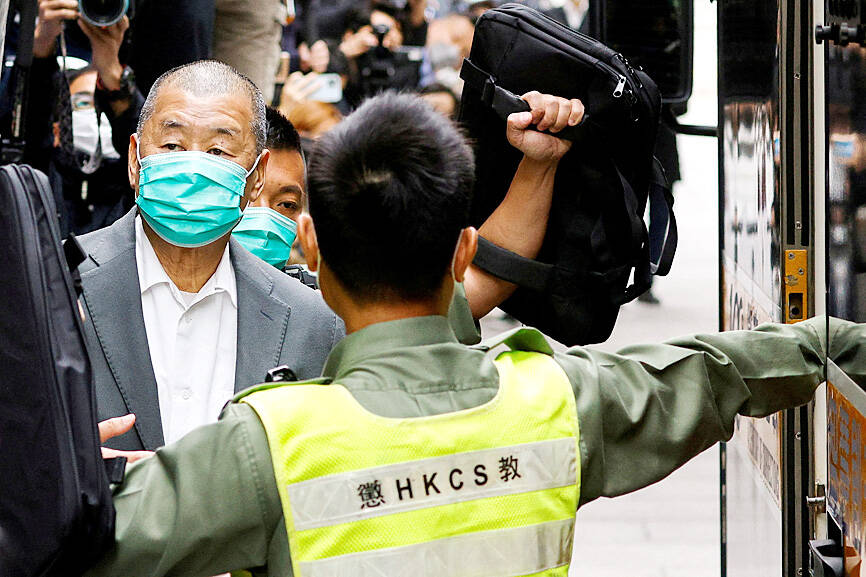Pro-democracy Hong Kong tycoon Jimmy Lai (黎智英) was yesterday sentenced to five years and nine months in prison for fraud, convicted of contravening a lease contract for the headquarters of a newspaper he used to run.
Lai, 75, was found guilty of two counts of fraud for covering up the operations of a private company, Dico Consultants Ltd (力高顧問有限公司), at the headquarters of the now shuttered Apple Daily newspaper, in what was ruled a breach of its land lease.
Hong Kong’s most prominent China critic, Lai has been behind bars since December 2020 and has served 20 months for unauthorized assemblies.

Photo: Reuters
He was the head of Next Digital Ltd (壹傳媒集團), the parent company of Apple Daily, which shut down in June last year after a police raid.
Another Next Digital executive, Wong Wai-keung (黃偉強), 61, was found guilty of fraud and jailed for 21 months.
Handing down the sentences, District Court Judge Stanley Chan (陳廣池) said the contraventions, which he called “organized and planned,” occurred over two decades and that Lai had used his media organization as “an umbrella of protection.”
Lai did not feel guilty about the moves, so there was no basis for the court to reduce his jail term, he said, adding that the prosecution of a media tycoon “wasn’t equivalent to an attack on press freedom.”
The judge deducted three months from Lai’s sentence as he had acknowledged much of the prosecution’s case.
Western governments, including the US, have expressed concern about Lai’s plight and condemned what they call a broader deterioration in protection for human rights and fundamental freedoms in hong Kong under the China-imposed National Security Law.
“Beijing’s elaborate criminal case against Jimmy Lai is a vendetta against a leading proponent of democracy and media freedom in Hong Kong,” said Maya Wang (王松蓮), an associate director at Human Rights Watch’s Asia Division, which called for Lai’s release.
Prosecutors said that under the newspaper’s lease conditions on a plot of government land in a science park, the property could only be used for “publishing and printing” without prior approval from the operator.
Chan issued an order preventing Lai from becoming a director of any company for eight years and fined him HK$2 million (US$256,870).
A separate, landmark national security trial involving Lai is scheduled to resume on Tuesday.
Additional reporting by AP

MAKING WAVES: China’s maritime militia could become a nontraditional threat in war, clogging up shipping lanes to prevent US or Japanese intervention, a report said About 1,900 Chinese ships flying flags of convenience and fishing vessels that participated in China’s military exercises around Taiwan last month and in January last year have been listed for monitoring, Coast Guard Administration (CGA) Deputy Director-General Hsieh Ching-chin (謝慶欽) said yesterday. Following amendments to the Commercial Port Act (商港法) and the Law of Ships (船舶法) last month, the CGA can designate possible berthing areas or deny ports of call for vessels suspected of loitering around areas where undersea cables can be accessed, Oceans Affairs Council Minister Kuan Bi-ling (管碧玲) said. The list of suspected ships, originally 300, had risen to about

DAREDEVIL: Honnold said it had always been a dream of his to climb Taipei 101, while a Netflix producer said the skyscraper was ‘a real icon of this country’ US climber Alex Honnold yesterday took on Taiwan’s tallest building, becoming the first person to scale Taipei 101 without a rope, harness or safety net. Hundreds of spectators gathered at the base of the 101-story skyscraper to watch Honnold, 40, embark on his daredevil feat, which was also broadcast live on Netflix. Dressed in a red T-shirt and yellow custom-made climbing shoes, Honnold swiftly moved up the southeast face of the glass and steel building. At one point, he stepped onto a platform midway up to wave down at fans and onlookers who were taking photos. People watching from inside

Japan’s strategic alliance with the US would collapse if Tokyo were to turn away from a conflict in Taiwan, Japanese Prime Minister Sanae Takaichi said yesterday, but distanced herself from previous comments that suggested a possible military response in such an event. Takaichi expressed her latest views on a nationally broadcast TV program late on Monday, where an opposition party leader criticized her for igniting tensions with China with the earlier remarks. Ties between Japan and China have sunk to the worst level in years after Takaichi said in November that a hypothetical Chinese attack on Taiwan could bring about a Japanese

STREAMLINED: The dedicated funding would allow the US to transfer equipment to Taiwan when needed and order upgraded replacements for stockpiles, a source said The US House of Representatives on Thursday passed a defense appropriations bill totaling US$838.7 billion, of which US$1 billion is to be allocated to reinforcing security cooperation with Taiwan and US$150 million to replace defense articles provided to the nation. These are part of the Consolidated Appropriation Act, which the US House yesterday passed with 341 votes in favor and 88 against. The act must be passed by the US Senate before Friday next week to avoid another government shutdown. The US House Committee on Appropriations on Monday unveiled the act, saying that it allocates US$1 billion for the Taiwan Security Cooperation Initiative